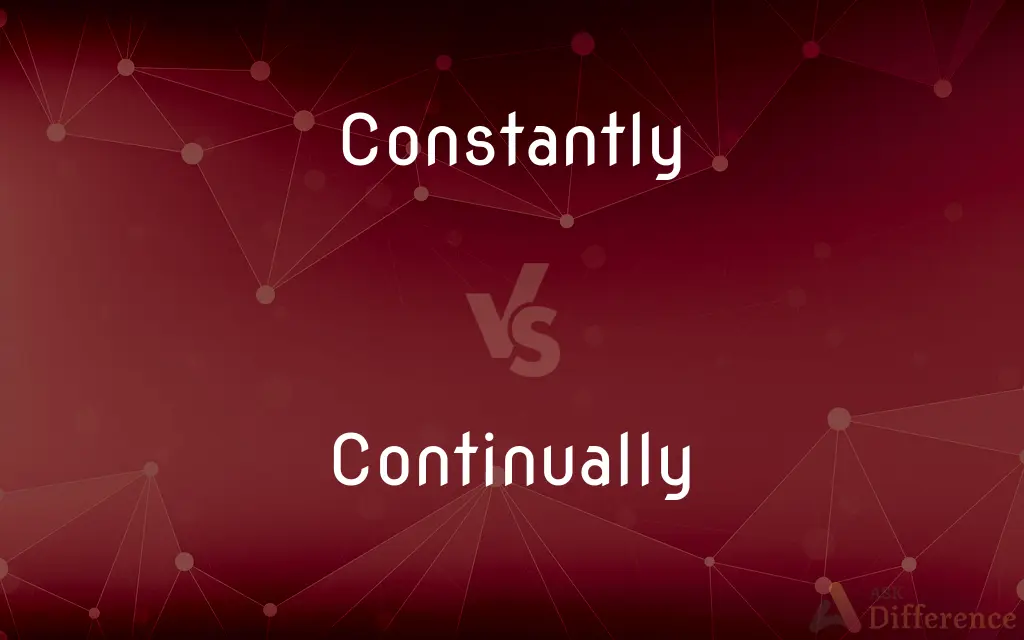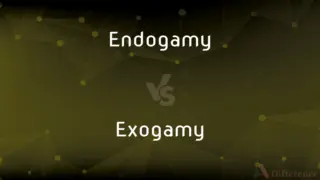Constantly vs. Continually — What's the Difference?
By Maham Liaqat & Urooj Arif — Updated on March 29, 2024
Constantly refers to actions happening without interruption, whereas continually implies actions that recur regularly with breaks in between.

Difference Between Constantly and Continually
Table of Contents
ADVERTISEMENT
Key Differences
Constantly describes actions or states that occur in an unbroken, uninterrupted manner, suggesting a level of permanence or persistence over time. This can apply to situations or behaviors that do not cease or vary, such as a machine that operates without stopping or a principle that remains unchanging. On the other hand, continually refers to actions or events that happen repeatedly over a period, but with intervals or breaks in between. It suggests a frequent recurrence rather than an unending process, such as meetings that occur regularly but not without end or a task that is done repeatedly with pauses.
Constantly can imply a degree of intensity or overwhelming persistence, often used to describe situations that might be seen as excessive or too much to handle. For example, someone might complain about a noise that is constantly present, indicating that it never stops and is therefore distressing. Whereas continually, though it also indicates repetition, doesn't carry the same weight of unendingness. It's more about the regularity of occurrence rather than the ceaselessness, which can imply a less intense or less overwhelming experience. For instance, rain that falls continually throughout the day suggests it stops at intervals, making it more bearable than a constant downpour.
In some contexts, the difference between constantly and continually can be nuanced, especially in casual conversation where they might be used interchangeably. However, in more precise or formal contexts, distinguishing between the two highlights an important difference in frequency and duration.
Understanding the difference between constantly and continually is crucial for accurate communication, especially in contexts where the nature of an action's duration or recurrence significantly affects the message being conveyed. This distinction helps in setting expectations about whether an event or action is unceasing or occurs with regular interruptions.
Comparison Chart
Definition
Happening without pause or interruption
Happening repeatedly with intervals
ADVERTISEMENT
Frequency
Uninterrupted, continuous
Regular but with breaks
Intensity
Can imply a higher level of intensity or pressure
Less intense due to breaks
Usage in Sentences
Used when there’s no stop in action
Used for actions that repeat with some pauses
Perception
Often viewed as overwhelming or excessive
Seen as less overwhelming, more manageable
Compare with Definitions
Constantly
Unceasing
The clock ticks constantly, marking the passage of time without interruption.
Continually
Frequently
The team meets continually to ensure the project stays on track.
Constantly
Persistent
She constantly works on improving her skills to stay ahead in her career.
Continually
Periodically
They conduct safety drills continually, every few months to ensure preparedness.
Constantly
Unchanging
His loyalty to his friends is constantly evident in his actions.
Continually
Regularly
She exercises continually, with rest days scheduled once a week.
Constantly
Perpetual
The city is known for its constantly bustling streets, alive at all hours.
Continually
Intermittently
Rain fell continually throughout the day, with brief periods of sunshine.
Constantly
Incessant
The constant chatter in the cafe creates a lively atmosphere.
Continually
Repeatedly
He continually checks his phone for updates, unable to focus.
Constantly
Not changing or varying; continuous
A constant gentle rain.
Drove at a constant speed.
Continually
Repeated frequently in the same way; regularly
This information is continually updated
Constantly
Happening regularly or repeatedly; continual
The constant barking of the dog next door.
Constant interruptions.
Continually
Without interruption; constantly
I was continually moving around
Constantly
Unchanging in nature, value, or extent; invariable
A constant wind speed.
Continually
Recurring regularly or frequently
Continual improvements in technology.
Constantly
Steadfast in purpose, loyalty, or affection; faithful
A constant friend.
Continually
Not interrupted; steady
A process that requires continual monitoring.
Constantly
Something that is unchanging or invariable.
Continually
In a continual manner; non-stop.
Constantly
A quantity assumed to have a fixed value in a specified mathematical context.
Continually
In regular or repeated succession; very often.
Constantly
An experimental or theoretical condition, factor, or quantity that does not vary or that is regarded as invariant in specified circumstances.
Continually
Without cessation; unceasingly; continuously; as, the current flows continually.
Why do not all animals continually increase in bigness?
Constantly
(archaic) With steadfastness; with resolve; in loyalty, faithfully.
Continually
In regular or repeated succession; very often.
Thou shalt eat bread at my table continually.
Constantly
In a constant manner; occurring continuously; persistently.
Continually
Seemingly without interruption;
Complained continually that there wasn't enough money
Constantly
(frequency) Recurring regularly.
I find that I am constantly reminding you to feed your pets.
Constantly
In an unchangeable or invariable manner; in every case.
Constantly
With constancy; steadily; continually; perseveringly; without cessation; uniformly.
But she constantly affirmed that it was even so.
Constantly
Seemingly uninterrupted;
Constantly bullied by his big brother
Was perpetually answering the doorbell
Constantly
Without variation or change;
Constantly kind and gracious
Constantly
Without interruption;
The world is constantly changing
Common Curiosities
Can continually be used to describe occasional events?
Not exactly; continually implies a regular pattern of recurrence, rather than just occasional events.
Does constantly imply negativity?
Not inherently, but it can be used in contexts that suggest overwhelming or excessive conditions.
Can a situation be both constant and continual?
Conceptually, yes, if an action is unbroken over a period but occurs in cycles with pauses between them.
How does constantly affect perception in communication?
Using constantly can emphasize the unbroken nature of an action or state, potentially intensifying the listener's perception of the situation.
Is constantly the same as always?
Yes, constantly often means the same as always, implying continuous action without breaks.
Is it correct to use continually and constantly interchangeably?
While they are often used interchangeably in casual speech, they have distinct meanings and should be used appropriately for precision.
How do I choose between constantly and continually?
Consider whether you're describing an uninterrupted state (constantly) or repeated actions with breaks (continually).
Can constantly and continually be used in scientific contexts?
Yes, to describe phenomena or processes either occurring without interruption or repeating with regular intervals.
Which is more intense, constantly or continually?
Constantly is generally more intense because it implies no breaks in action or state.
Does the choice between constantly and continually affect the tone of a message?
Yes, choosing one over the other can subtly change the tone, with constantly possibly sounding more serious or urgent.
Is constantly used more in negative contexts?
It can be, especially to describe situations that are unrelentingly bothersome or stressful.
Can continually imply improvement?
Yes, especially in contexts where repeated efforts are made towards progress, such as learning or skill development.
How does literature use constantly and continually?
Literature may use both to describe characters' actions or settings, with their choice adding to the narrative's texture.
Are there synonyms for constantly and continually that can soften their impact?
Yes, using terms like "regularly" for continually or "often" for constantly can soften the perceived intensity.
Is the difference between constantly and continually evolving?
Language evolves, but the core distinction between these terms remains important for clarity and precision.
Share Your Discovery

Previous Comparison
Endogamy vs. Exogamy
Next Comparison
Manned vs. UnmannedAuthor Spotlight
Written by
Maham LiaqatCo-written by
Urooj ArifUrooj is a skilled content writer at Ask Difference, known for her exceptional ability to simplify complex topics into engaging and informative content. With a passion for research and a flair for clear, concise writing, she consistently delivers articles that resonate with our diverse audience.














































